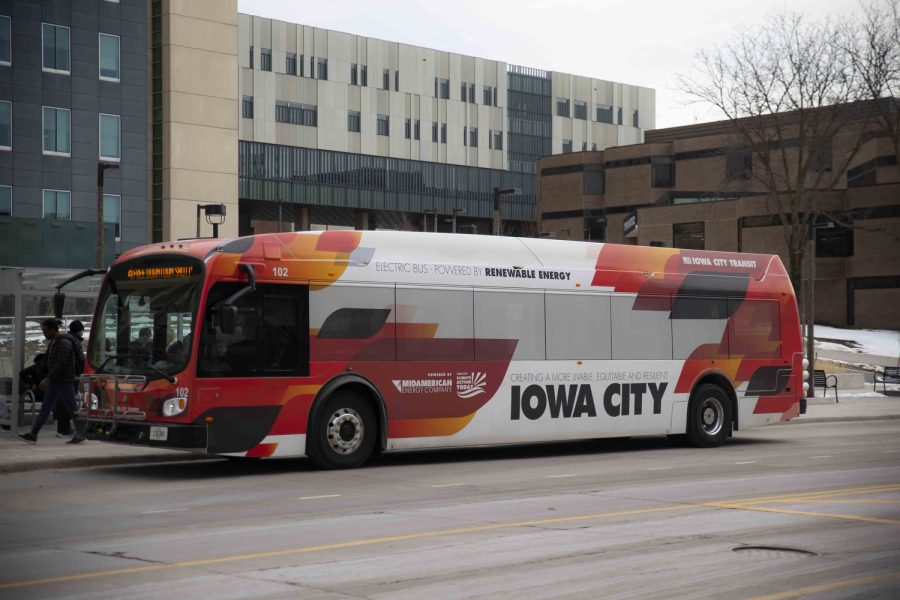Iowa City Transit started reducing its services on Monday due to a shortage of bus drivers.
Darian Nagle-Gamm, Iowa City Transit director of transportation services, said the service is currently eight drivers short of the staff required to run Iowa City Transit at its regular service levels. It currently operate with a staff of 48 drivers, about half of which are full-time and the other half of which work part-time.
The Downtown Shuttle, which operates while the University of Iowa is in session from August to May, will halt operations early this year on Monday. The Peninsula and South Gilbert shuttles will now operate on an hourly basis, compared to their previous service.
Alternative bus routes include Court Street, Towncrest, and Lower Muscatine, which are recommended depending on where commuters live. The Court Street route can be found at the intersection of Burlington Street and Lucas Street and operates on 20-minute services on weekdays and a 40-minute service on the weekends.
The Lower Muscatine route can be found at the intersection of Dodge Street and Bowery Street or Van Buren Street and Bowery Street. The route operates on the same schedule as Court Street and Towncrest.
Nagle-Gamm said the change to services will be reevaluated in late summer, and that Iowa City Transit has experienced shortages such as this one in the past, causing temporary service reductions.
“Each time, we have returned to typical transit service levels when staff levels increase,” Nagle-Gamm said.
Jeremy Endsley, president of the Community Transportation Committee, a nonprofit that advocates to expand transportation-to-work options, said many driver positions for these buses have been open for over a year, but have yet to be filled.
Endsley said he heard many drivers have issues with their hours and are not happy with their schedules.
“If people are out, then other bus drivers have to learn new routes and take over longer hours, placing a strain on the system as a whole,” Endsley said.
Nagle-Gamm said transit drivers begin with 30-hour weeks and can increase the number of extra shifts as desired.
“To help ensure buses are on the road serving our community, they have really pitched in and are working long hours to help fill open shifts,” Nagle-Gamm said.
Endsley said the transit service is important to lower-income passengers who rely on the bus systems to get to and from work.
“It helps many people get to school, doctor’s appointments, getting to the grocery store, and seniors who can’t drive anymore,” Endsley said.
Douglas Kollasch, chair of the Iowa City Human Rights Commission, said the fewer bus drivers there are, the more that current drivers have to work.
“Anyone who drives knows that if you are overworked and tired, driving is not the best thing, and that places an unfair burden on drivers,” Kollasch said.
Currently, the Johnson County Community Transportation Committee aims to propose a new Transit Advisory Commission to the Iowa City City Council. Endsley said the commission will enable the city to bring together drivers and members of the Iowa City community to more effectively plan transit services.
“One of the things we could potentially do would be to build better compensation benefits, schedules, and working conditions for drivers,” Endsley said.
Endsley said the commission has received support from the Human Rights Commission and will now go to the city council under further consideration.
“We are working on organizing support for that kind of grassroots-level issue,” Endsley said.
Kollasch said the commission would help make recommendations to the city council to allocate resources and direct transit authority on how to make improvements to its department.
He said if transit services are expanded, more job opportunities will become available and job recruitment will increase as well.
RELATED: Free Iowa City transit fares well with UI students
Nagle-Gamm said Iowa City Transit is currently hiring, starting at $22.99 per hour for bus drivers. The opportunity to increase that pay to $26.64 per hour is available after six months in the position.
“We do not require a commercial driver’s license, and offer on-the-job training,” Nagle-Gamm said.
Additionally, drivers receive benefits such as comprehensive health care, dental and vision coverage, and retirement benefits, Nagle-Gamm said.
Currently, Iowa City Transit is working to advertise its job openings by using bus headsigns and placing posters in the Pedestrian Mall and at the Downtown Interchange.
Kollasch said many of the questions posed by the committee during their presentation to the Human Rights Commission were about the low number of current bus drivers and ways to make the profession more attractive to improve recruitment and get more people in the role.
“Public transportation is many people’s way of getting to and from work, health care services, and especially for immigrant communities who may not have a driver’s license, this service is essential,” Kollasch said.



